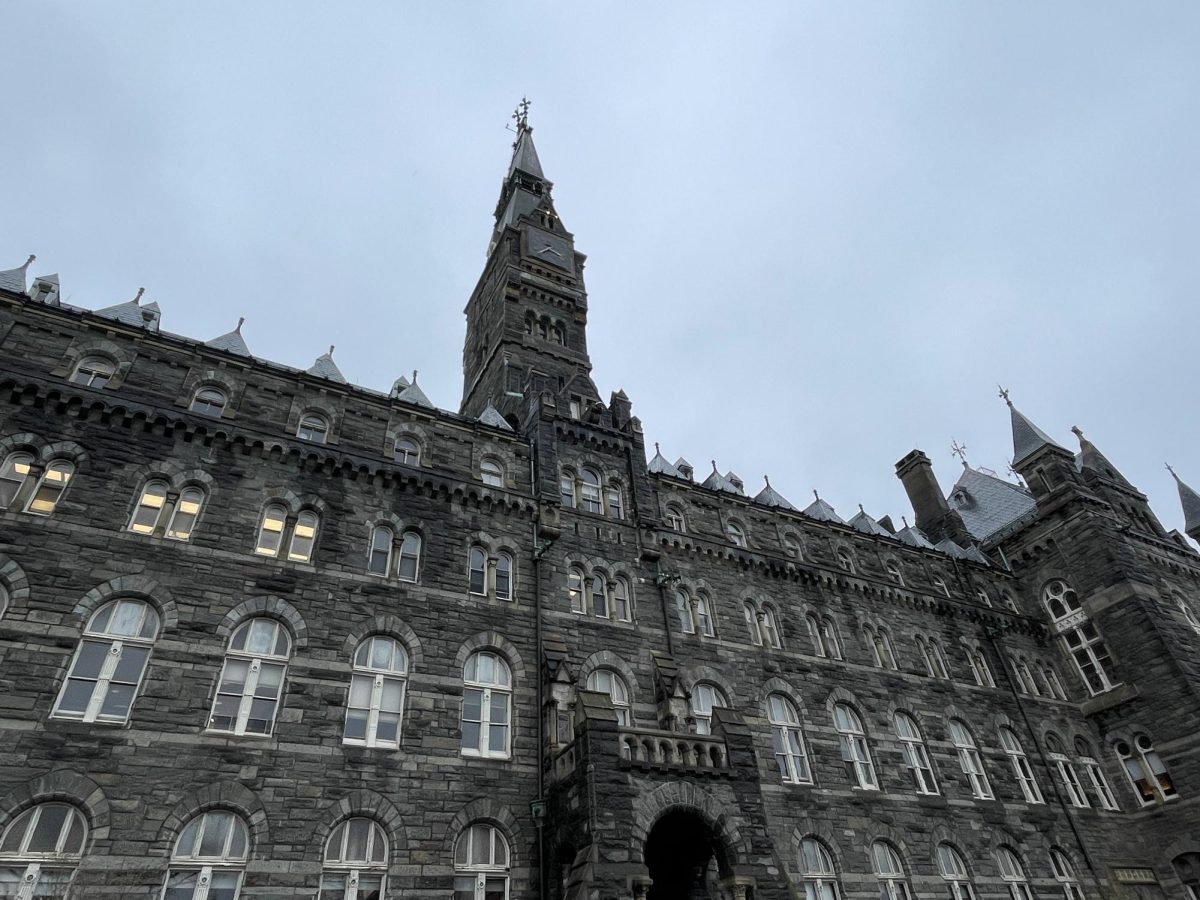Georgetown University undergraduates voiced worries and excitement in advance of the April 14-16 referendum on whether the university should divest from companies and academic institutions linked to Israel’s government.
The Georgetown University Student Association (GUSA) Senate, the legislative body of Georgetown’s student government, voted April 6 to place the nonbinding question before the student body. To pass, the referendum will require a 25% turnout and a majority vote.
Meriam Ahmad (SFS ’26), the GUSA senator who introduced the referendum with senator Sienna Lipton (CAS ’27), said it enables students to communicate their opinions on a nationwide conversation to the university.
“My colleague and I worked to introduce this referendum because we believe that students should have the opportunity to voice their opinions on a question that has been asked across the country,” Ahmad wrote to The Hoya. “A referendum allows the student body to make their voices heard on this issue.”
“I hope that the Georgetown community uses this opportunity to engage in the democratic process that a referendum brings,” Ahmad added. “I would highly encourage the entire undergraduate student body to vote!”

The referendum, which will have no binding effect on university policy, asks voters whether they support the university’s divesting from its investments in companies with ties to Israel’s government. Georgetown’s investment in Google’s holding company, Alphabet, is valued at approximately $43 million, and the university’s investment in Amazon is valued at about $12.7 million. Both companies have provided technology to the Israeli military.
“I support Georgetown University disclosing all private investments to its community members and upholding its Socially Responsible Investment Policy, through divesting from companies arming Israel and ending university partnerships with Israeli institutions,” the referendum will read.
The referendum is a response to ongoing violence in the Middle East, which has prompted protests and vigils across campus for over a year. The most recent stage of the conflict escalated Oct. 7, 2023, when Hamas and other militant groups attacked Israel, killing about 1,200 people and taking 251 hostages. Israel’s subsequent invasion of Gaza has killed over 50,000 Palestinians and displaced 1.9 million Gazans.
Nate Schindler (MSB ’26) — a member of the Georgetown Israel Alliance, a student organization supporting Israel — said politicization of the Israel-Hamas war may impact students’ vote on the referendum.
“I think around the topic, there are sound bites that get caught in the media when it comes to the opposite side of the conflict, and people go around chanting, and they’re easy to pick up because they rhyme, but that’s in no way able to summarize this entire conflict,” Schindler told The Hoya. “I think there are huge, gigantic claims of genocide and apartheid that people take at face value, rather than thinking through on a deeper level.”
Two resolutions have recently passed through the student body referendum process. In 2019, students passed a referendum asking the university to use a portion of tuition fees to support descendants of the GU272+, the 314 enslaved people sold by the Maryland Province of the Society of Jesus in 1838 to financially sustain the school. While the university did not adopt the measure, it launched a $400,000 reconciliation fund providing grants for community-based research projects impacting descendants of the GU272+.
Last June, a passed referendum implemented by university administration made gender-inclusive housing available to the Class of 2028.
Some GUSA senators and Georgetown community members voiced concern over senators voting without long-term public attribution to advance the referendum — a departure from standard GUSA procedure — and bypassing the senate’s Policy and Advocacy Committee (PAC), which determines whether to send legislation before the full senate.
Marina Chernin (SFS ’27), a GIA member, said she felt taken aback by the GUSA referendum’s sudden entrance into public light.
“It was done under the shadow of secrecy, which I think is just contrary to the principle of democracy of, ‘Let everything out into the light,’” Chernin told The Hoya.
“It’s a really disappointing statement to come from my representatives, whom I elected to speak for my voice and the fact that they did it in such an undemocratic way — I would love to say shocked, but I wasn’t even shocked, just sad,” Chernin added.
Senator Evan Cornell (CAS ’27) said voting procedures on introducing the referendum strayed from typical GUSA procedure as a caution for senators’ safety.
“As for how this referendum was voted on to be authorized, out of an abundance of caution and for the sake of Senator or GUSA member safety and security it was necessary to only publicly report, as the Bylaws require, the final vote count,” Cornell wrote to The Hoya.
“Each referendum that students have recently voted on in past referendums was brought to the student body by breaking Senate rules for whatever reason each introducer had,” Cornell added. “This may have been unorthodox, but it definitely was not a departure from either precedent or the past.”
Some students said they support the referendum’s goal of disengaging the university from the violence in the Middle East.
Lela Tolajian (SFS ’26) said the referendum signifies an opportunity for students to choose a new path forward for Georgetown.
“Georgetown has a moral imperative to divest from the corporations facilitating the genocide in Palestine,” Tolajian wrote to The Hoya. “Our university’s ongoing complicity in mass slaughter, scholasticide and war crimes is beyond shameful.”
“While this referendum is non-binding, it is a key step in continuing to escalate pressure on our university to divest from genocide and cut all ties with Zionism,” Tolajian added.
Fiona Naughton (SFS ’26) said she plans to vote in favor of the referendum.
“This is an issue that is hugely impactful,” Naughton told The Hoya. “Georgetown has over $57 million invested in the genocide of the Palestinian people.”
“And that is why I will be voting for divestment in the referendum, because I believe that an educational institution should, in no way, shape or form, have any financial investment in genocide,” Naughton added. “And I think it’s egregious and morally reprehensible for any of our tuition dollars to be going towards the bombing and slaughter of innocent civilians in Palestine.”
In contrast, Chernin said she believes the referendum itself to be antisemitic, as it criticizes Israel for human rights violations without referencing other violations in Qatar and China.
“You can have conversations about where the school should be investing,” Chernin said. “But the fact that I’ve not seen anything about Qatar, not seen anything about China, I’ve not seen anything about all of these different countries and companies that our school is invested in, you have to ask, ‘Why is Israel the only one that’s getting this attention?’”
“Why did there have to be the secretive referendum about this one country? About this one country out of all the countries in the world?” Chernin added.
Naughton said the referendum, despite being nonbinding, will allow students to voice their opinions to the administration.
“It’s very much symbolic, but symbolic decisions also carry a lot of weight,” Naughton told The Hoya. “I think that, considering this within the context of the GU272 referendum, it’s really important to remember that the university is not bound to a referendum, but that it’s still such an incredibly important way for the administration to know the true demands and desires of the student body.”









